- Home›
- Healthy Living›
- 25 Reasons That Will Force You To Stop Eating Meat Again
25 Reasons That Will Force You To Stop Eating Meat Again
By: Priyanka Maheshwari Tue, 15 Sept 2020 11:03:19
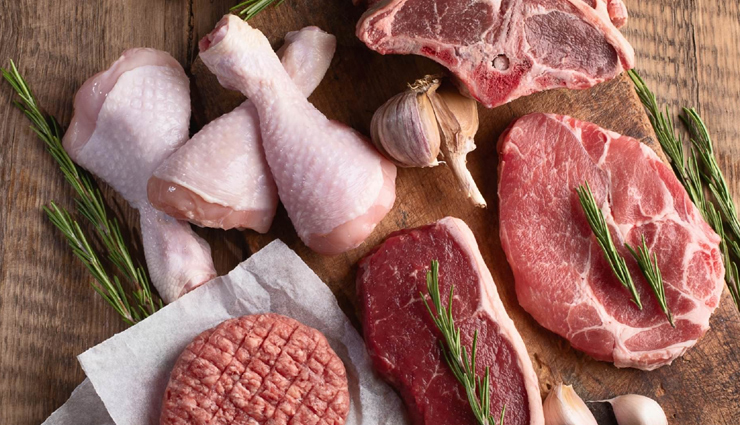
Ever since you were little, your plate has probably been loaded up with some sort of meat it's the American way, after all. Because of all those years of tradition, it's hard to rethink your proteinóbut there are plenty of reasons you want to follow a vegan diet and never want to touch the animal-derived option ever again.
Aside from antibiotics being pumped into your beef patty, research has shown that loading up on meat isn't doing your health and well-being any favors. On top of the many diseases and issues that come from putting it in your own body, not many people realize the process of getting it from factory farms to grocery stores is also downright cruel to the animals involved, as well as detrimental to the environment.
So before you have another bite, take a deep-dive into the reality of meat. Because when it comes to eating animals, ignorance definitely isn't bliss. And if you've decided to follow a vegan diet or limit your meat intake, read up on all the awesome reasons to be a vegan.
It's Full of Hormones
Some people are still so afraid of eating soy whether that's tofu, tempeh, or straight-up edamame because of past claims that it could affect your body's hormones and cause issues like cancer. What's funny, though, is that it's been proven to be totally safe and not increase your risk of cancer. In fact, it might actually reduce the risk. Meanwhile, the Food and Drug Administration (FDA) reports the world is still eating meat that's pumped with all sorts of hormones including estrogen, progesterone, and testosterone to speed up animals' growth so steaks and burgers get on your plate faster. In many cases, the hormones in animal protein are the ones that actually cause problems, whether that's upping your chances of cancer or heart attacks. Ironic, huh?
Those "Free-Range" Labels Aren't What They Seem
Buying free-range animal products sounds a lot nicer, right? Unfortunately, that's not the case for the animals. "When you actually get a look at most of these free-range farms, they frankly don't work better or different than factory farms," says Ashley Byrne, campaign specialist at PETA.
"You still see the crowded conditions and animals being deprived of everything natural to them. Free-range basically means there's a tiny little outdoor area that a lot of the birds can't even reach because of the extreme overcrowding inside of the shed. The animals on so-called 'free-range' or 'humane' farms generally still go to the same slaughterhouses and endure the same terrifying journey and violent, painful deaths."
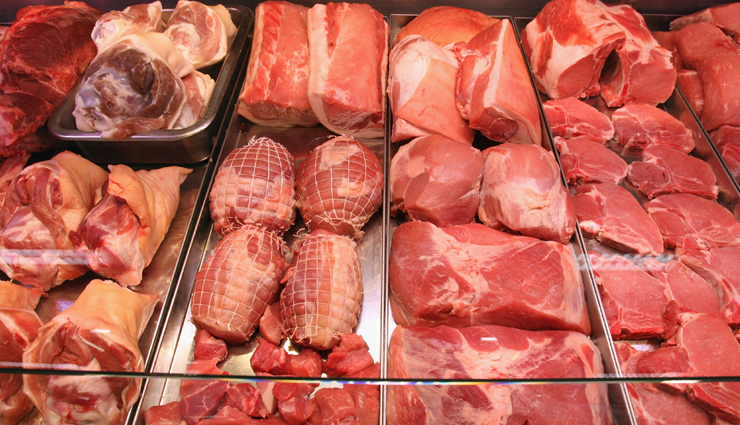
It's Full of Antibiotics That Can Make You Sick
Hormones are one thing, but meat is also full of antibiotics. Because of how many are given to farm animals to keep them from dying which, by the way, is about 80 percent of all antibiotics used in the U.S. some dangerous strains of bacteria in the animal become resistant to certain drugs. That means eating the meat could introduce super-harmful bacteria into your own body, which could make you sick, says PBS. And one of those food borne illness-causing bacteria strains you hear about so much? Salmonella, which the CDC says makes 1.2 million people sick and causes 450 deaths in the United States every year.
The Process from Animal to Plate Is Gag-Worthy
y the time your meat gets on your plate, it probably doesn't look unappetizing. But have you ever thought about what goes on during its process from the slaughterhouse to the grocery store? Well, get ready to gag: Reports have shown your meat comes with a side of some pretty disgusting stuff, including feces and tumors. (And this doesn't even include the pus that's legally allowed in your milk.)
"The things that end up in meat either that aren't supposed to be there or that are allowed to be there are really horrifying," Byrne says. "A huge amount of meat is contaminated with feces. The majority of chicken and turkey meat are contaminated with salmonella or other food borne diseases that can be deadly if the meat isn't cooked or handled properly. People who work in facilities or have inspected meat talk about seeing meat with tumors and mold spots and all kinds of other things that go by on the assembly line without being taken out."
It Can Cause Breast Cancer
There are an estimated 330,000 new cases of breast cancer in the U.S. every year, and multiple studies have shown eating meat increases your risk. One study published in BMC Public Health, in particular, found simply ridding meat from your diet could protect you from the disease, while eating it was associated with upping your risk. Unfortunately, the effects start young, too: Another study from the Harvard School of Public Health found eating just a single serving of meat a day in adolescence was linked to a 22 percent increased risk of breast cancer, and eating a daily serving in adulthood was linked with a 13 percent increased risk.
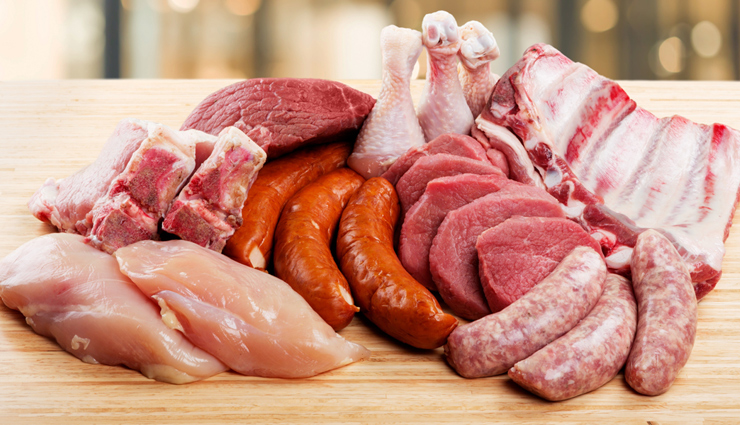
You Can Get All the Protein You Need from Plants
Everyone's probably wondered "how do you get protein if you don't eat meat?" Well, it's actually really easyóand plant protein is a healthier source than animal protein, anyway. While not all plant proteins have all nine essential amino acids, the ones that do include quinoa, chia seeds, soy, and spirulina. Amino acids are the building blocks of muscles, and essential amino acids are the ones our bodies can't make so we have to get them from our diet. "Those eating plant-based diets average about twice the average daily requirement for protein," Dr. Michael Greger, MD, author of How Not to Die.
There's No "Humane" Way to Get Meat
You hear the meat industry talk about the "humane" ways they kill animals. The sad reality, though? Those "humane" methods typically involve stunning cows, pigs, sheep, and other animals by shooting them in the forehead with a captive bolt pistol. The device electrocutes them before their throats are slit and keep their hearts beating so they'll bleed out. Unfortunately, because of how quickly the process is, millions of animals are still fully conscious for up to seven minutes after being stunned and feel the pain of being dismembered. Chicken, turkeys, and other birds, on the other hand, aren't protected by the Humane Slaughter Act, so they're always fully conscious.
Whether you view these kill methods as humane or not, there's one fact that remains about the issue: "There's no humane way to kill an animal who doesn't want to die. It's a nice label, but it doesn't mean much," Byrne says. And no matter how you slaughter an animal, it's never going to be truly cruelty-free. "It's not even just the slaughter itselfóit's that they wait while the other animals go ahead of them: They can hear them screaming and see them dying or being dismembered. It's very grisly. There's really nothing nice about it."
Eating Meat Can Lead to Colon Cancer
While breast cancer is a biggie, so is colon cancer. It's the third most common cancer in men and women in the U.S., and eating meat isn't helping those statistics. According to one study, those who eat processed or red meat are 50 percent more likely to have colon cancer than those who don't eat meat. Pretty scary, huh?
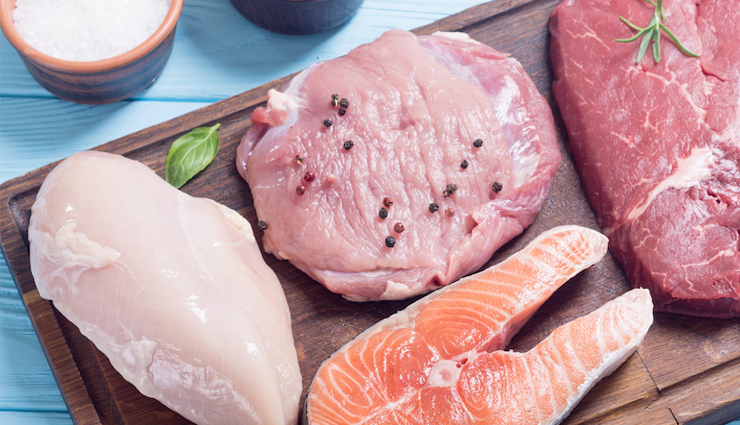
It Can Lead to Lots of Different Forms of Cancer
One of the best ways to cut down your risk of many different types of cancer is to swap animal protein with healthier plant options. "Those who frequently eat meat tend to have a higher risk for cancers of various kinds than those who don't, including colon, breast, bladder, and prostate cancer. Your best cancer prevention might just be going meat-free," says plant-based nutritionist Courtney Pool.
You're Eating Mechanically Separated Meat
Every summer, millions of hot dogs are eaten by people around the world but not many realize what's actually in them. Basically, the BBQ staple is filled with "a paste-like and batter-like poultry product produced by forcing bones with attached edible tissue through a sieve or similar device under high pressure to separate bone from the edible tissue," according to the USDA. Sounds delicious, right? Wrong.
It Can Put You at Risk of Heart Disease
At this point, heart disease and eating meat pretty much go hand in hand. "There have been countless studies on the fact that the more meat a person eats, the more tendency there is toward heart disease," Pool says. In fact, in one study that looked at 50 different diseases across China, researchers found those who ate a very low intake of animal protein had much lower rates of chronic diseases including coronary heart disease than those who ate a high intake of animal protein in the U.S. "Love your heart and leave the meat off your plate. Instead, opt for the many plant-based options for protein, which are just as effective and far better for your cardiovascular system."
Animals Have Feelings and Emotions
While dogs and cats are spoiled as much as children with cozy beds, treats, and an endless amount of love, animals raised for meat have quite the opposite lives. "All these animals be it pigs, cows, chicken, turkeys, or fish are intelligent, sensitive animals that feel pain just like our dogs and cats, yet billions of them are killed in the U.S. every year for food," Byrne says. Most of these animals who love nothing more than belly rubs and learning new tricks are confined to cramped pens in factory farms that they can't even move in, have their babies taken away from them right after birth, and after a life of abuse, eventually endure a painful death. "It's cruelty and suffering on such a vast and overwhelming scale, and it's completely unnecessary."
Meat Can Negatively Affect Your Mood
Anyone who feels down on the regular could get a nice mood boost from the simple act of ditching meat. In one study, researchers found that eating a vegan diet instead of animal protein seriously improved symptoms of depression and anxiety. The study included GEICO employees with a BMI of 25 or higher or were previously diagnosed with type 2 diabetes. After 18 weeks of following a plant-based diet, the participants reported less anxiety, depression, and fatigue.
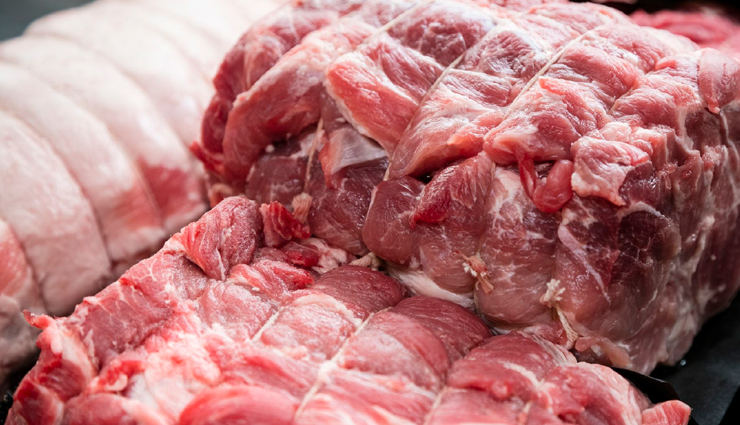
There Are So Many Great Replacements
A decade ago, it was much harder to find vegan meat replacements that made people want to give up their diet staples. Now, there are plenty of options that have the same taste and texture as the real thing. Meat-free hot dogs are better than the pig versions (try Lightlife's!), there are veggie burgers that actually bleed (including both the Impossible Burger and Beyond Burger), and chicken tenders (go for Gardein's!) that could fool just about anyone. Basically, there's no longer a need to harm animals to get your favorite foods neither for flavor or for your health.
Ditching Meat Can Help Improve Asthma
Anyone who has asthma knows how much it can affect your well-being. Constantly carrying around an inhaler just in case breathing becomes an issue is a constant worry, and it turns out ridding your diet of meat could help improve the symptoms associated with the condition. In one study, participants who have had serious issues for years switched over to a vegan diet and nearly all of their symptoms disappeared.
It's Putting You at Risk of Having a Stroke
You might not hear about strokes very often, but more than 795,000 people have them every single year in the U.S., making it the fifth leading cause of death. The good news? Ditching meat can help prevent them. One study found avoiding meat and processed foods and increasing your intake of fruits, veggies, and whole grains could help cut your risk of all the problems that often cause strokes in the first place.
Turkeys and Chickens Are Genetically Modified
Both turkeys and chickens live miserable lives: They've been genetically modified to grow so big and fast that their bones can't even carry their weight anymore, making it so painful to move that they often crawl or walk on their wings just to get the food and water they need to survive. On top of that, their larger frames which, for turkeys, is four times bigger than what it would be in the wild also often causes heart attacks. Everyone wants that nice white breast meat, but how it gets on plates is incredibly sad.
It Hurts Your Gut Health
Good gut health has been proven as something that's just as important for your physical health as it is for your mental health, and eating meat is no way to keep your bacteria happy. In a study published in the journal Nutrients, researchers found that when compared to meat-eaters, vegans had healthy guts with less disease-causing organisms, as well as more immune-boosting bacteria and lower levels of inflammation.
Meat Can Affect Your Sex Drive
If your sex drive has been seriously lacking, there might be a reason for that: all the meat in your diet. Heck, even PETA has joked about it being an issue. "Your sex drive can definitely be affected by meat-eating," Pool says. "Eating meat is associated with higher blood pressure and heart disease. This means impaired blood flow throughout the body, including to the sexual organs."
It Can Cause as Much Harm as Smoking
Every day, you're told smoking is bad for you through TV commercials and basically everyone you know. One thing not as many people are talking about, though, is the negative consequences of meat. In one study, researchers found that those who had plenty of animal protein (almost 20 percent of calories from protein) in their diet were 74 percent more likely to die of any cause including several times more likely to die of diabetes and four times more likely to die of cancer. According to the University of Southern California, that's right up there with your risk of dying from smoking.
Meat Shortens Your Lifespan
You might love the taste of beef burgers but is it really worth shortening your life for, especially when there are such realistic meat-free versions available? According to the National Institutes of Health (NIH), eating meat on the regular especially red meat is linked to an increased risk of mortality from multiple different diseases.
Eating Even Just a Little Can Negatively Impact Your Health
What's one hot dog matter, you ask? According to research, quite a lot. One study found even one additional serving per day of unprocessed meat increased people's risk of dying by 13 percent. And processed meat like bacon, hot dogs, and sausage increased that risk by 20 percent.
It Harms the Environment
Did you know just one pound of beef takes 1,800 gallons of water to produce? Yeah, cutting your showers short to save the environment has nothing on ditching meat especially when 80 percent of the U.S.' water use is from agriculture alone. On top of the water issue, animal agriculture is also the leading cause of what's ruining the rain forests and is responsible for 91 percent of the destruction of the Amazon.
The 'Happy Cow' Mentality Is a Myth
Sorry, but those commercials of happy cows frolicking in sunny green meadows are anything but the truth. In reality, no animal is happy if they're in the food industry quite simply because their only fate is becoming food. "The vast majority of animals raised for food in the United States endure a life of misery and pain on factory farms," writes Joe Loria, content manager for Mercy for Animals. "These poor animals will never see sunlight or breathe fresh air until the day they're loaded into overcrowded transport trucks and shipped to slaughter."
Animal Mothers Love Their Babies Just as Much as Human Moms
Most people don't think about the trauma animals endure when they aren't able to nurture their young something that's so natural to them and in their DNA. And one animal in particular that goes through a lot of heartache before becoming meat? Cows. "Dairy cows are forcibly impregnated over and over, then they give birth to calves who are almost immediately taken away from them," Byrne says. "Cows who are separated from their babies are terrified they even chase after the trucks when they're taken away and can be heard wailing in agony after they're gone."
Then after going through a life of producing milk and constantly getting separated from their young, they head off to the slaughterhouse, just like their babies. "When a dairy cow is spent and their milk production drops, they'll be trucked to the slaughterhouse and killed for low-quality meat, like hamburger," explains Byrne. "And the babies of dairy cows are often used for veal. The male calves are chained up and kept in tiny pens after birth so they can't walk. That way, their muscles will stay weak. They're so deprived of iron that they'll even lick the bars of their cages just to try and get what they need."





